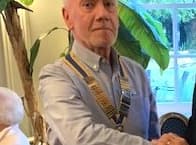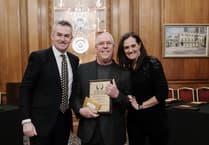The moving tributes given for Holocaust survivor Zigi Shipper, who died last week on his 93rd birthday, were a poignant reminder of the horrors inflicted on millions of people by the Nazis during the Second World War.
Zigi Shipper was a survivor of the Jewish ghetto created by the Nazis in the city of Lodz in Poland.
When the gates closed on the ghetto on April 30, 1940, it housed 163,777 residents; 210,000 Jews passed through it, with only 877 surviving when it was liberated.
Zigi also survived the Stutthof and Auschwitz concentration camps, both in Poland.
Stutthof became a concentration camp in 1942, and in early 1944 the Nazis converted it into an extermination camp; 65,000 inmates died there.
At Auschwitz more than 1.1million people had died by the time the war ended in 1945.
Two years later Zigi arrived in the UK and began sharing his testimony in schools right across the country.
In 2016 he was awarded a British Empire Medal for his work with the Holocaust Educational Trust (HET).
January 27 is Holocaust Memorial Day, and our opportunity to honour all those who died and hear from those who witnessed the inhuman brutality of the Nazi regime.
Sadly, with fewer survivors able to speak directly about their experiences, we rely more on filmed testimonies and archive material to ensure young people today are aware and understand what happened across Europe 80 years ago.
Schools and groups in East Hampshire will once again cover this difficult but vital subject.
I was particularly struck by this year’s theme – ordinary people – and how well that depicts the perpetrators, the bystanders, the rescuers, the witnesses – and, of course, the victims.
Holocaust survivors have witnessed extraordinary things and some, like Zigi, have become extraordinary in their ability to share their experiences.
But survivors also go on to live ordinary lives, dealing with the same day-to-day challenges as others.
The reality is that ordinary people were involved in all aspects of the Holocaust.
Some were people who abused their positions of power to discriminate, persecute and ultimately murder others.
Others were the ordinary police officers involved in rounding up victims, the secretaries who typed up the records, the medics who selected individuals, the neighbours who turned in friends.
Ordinary people turned a blind eye to the atrocities, or believed the Nazi propaganda.
Ordinary people are persecuted simply for being part of a particular group.
And ordinary people made courageous decisions to rescue, to hide or to help others.
Places once known as ordinary are altered by the acts that happen there – schools, hospitals, churches, forests and fields. Forever changed by the events.
Ordinary objects take on new meanings – perhaps as evidence of genocide or symbolic of survival.
Anyone who has been to Auschwitz will never forget the piles of shoes, the suitcases, the glasses once worn by victims.
It is this ordinariness that we need to remember.
It is part of every genocide the world has witnessed.
And it is sadly part of conflicts that continue today.
The war in Ukraine is yet another example of ordinary people suffering the pursuits of power.
Holocaust Memorial Day serves to remind us of the choices we have in our own ordinary lives, to challenge prejudice or to stand up to hatred for instance, and that is why the work done by the Holocaust Educational Trust remains so important, now and into the future.





Comments
This article has no comments yet. Be the first to leave a comment.